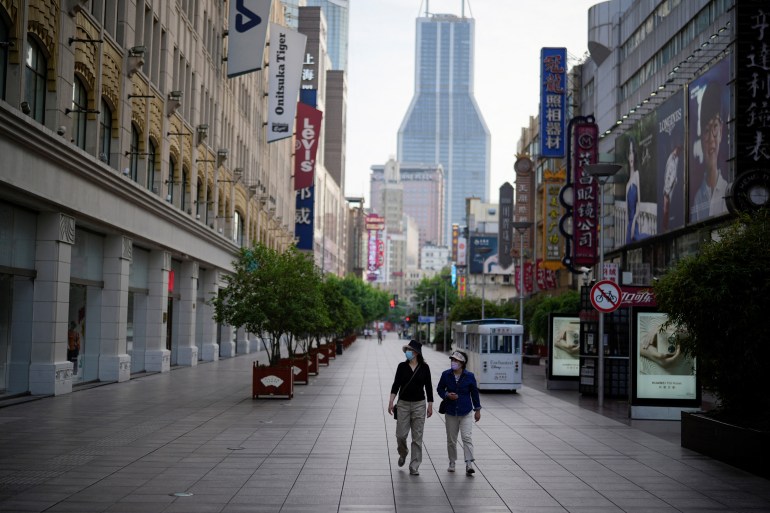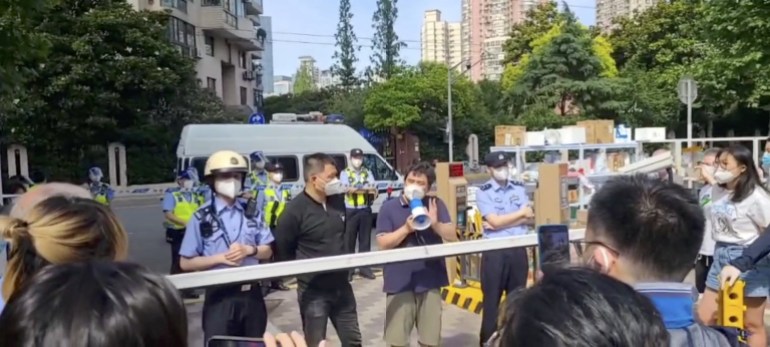Kuala Lumpur, Malaysia – As China prepares to hold its once-every-five-years leadership gathering, businesses and investors are watching closely for any signs of an exit from Beijing’s punishing “dynamic zero-COVID” strategy.
The Chinese Communist Party (CCP) Congress, which begins on Sunday, offers Chinese President Xi Jinping an opportunity to set a new course for managing COVID-19 that is less disruptive to the economy and everyday life.
So far at least, there are few indications that Xi, who is expected to secure an unprecedented third term at the Congress, effectively solidifying his position as potential leader for life, has any intention of taking it.
Nearly three years into the world’s harshest pandemic controls, Beijing appears no closer to charting a path to normality than at the start of the pandemic.
Despite mounting economic damage and public frustration, localities across the country have doubled down on draconian control measures in the run-up to the Congress, while state-run media have warned of dire consequences should “zero-COVID” be abandoned.
On Monday, authorities in Fenyang, a city in the northern province of Shanxi, announced a lockdown after the discovery of a single preliminary positive case. In far-western Xinjiang, about 22 million people were banned from leaving the region last week due to rising cases, while a number of neighbourhoods in the financial capital Shanghai have been sealed off to stymie a small flareup in infections.
On Sunday, the nationwide daily tally of cases hit nearly 1,900, its highest in two months, raising fears of more sweeping lockdowns across the country ahead of the politically sensitive meeting.
While China has officially reported fewer than 1 million cases and far fewer deaths than other countries, its zero-tolerance policies have placed the economy and countless livelihoods under serious strain.

The world’s second-largest economy – which is facing a host of challenges including slowing global growth, a US-led crackdown on its tech industry, an exodus of foreign investment and a deflating property bubble – is expected to grow just 2.8 percent in 2022, according to the World Bank, compared with the Asia-Pacific average of 5.3 percent.
Josh Gardner, CEO and co-founder of Kung Fu Data, which advises companies on entering the Chinese market, said many businesses are scaling back or reassessing their operations in China due to the lack of clarity around returning to normal.
“I don’t see a parachute for any of the people in charge there right now. Where’s their political parachute? If they open up, what’s the benefit to them?” Gardner told Al Jazeera, referring to the incentives for Beijing to move away from “zero-COVID.”
“Everyone is sort of divesting or trying to off-shelf risk – you are not going to go all in on China,” Gardner added.
“You might continue to operate, you might have certain assets there, but I think by and large, at least for foreigners or for Chinese that have an overseas passport that are key investors in the market, they are going to be much more cautious in terms of how they interface with China.”
For Xi, who has staked considerable political capital on the claimed superiority of China’s handling of the pandemic compared with the West, a path out of draconian restrictions is difficult to see.
Countries that kept the virus under control until mass vaccination, such as Australia, Japan and South Korea, could not avoid significant levels of death and serious disease once infections took off among the population.
Some experts have speculated that China might feel more comfortable loosening restrictions once it approves its own mRNA vaccines, or after the “Two Sessions”, another key event on the political calendar, which takes place after the winter flu season in March.

But under either scenario, mass infection among 1.4 billion people would still almost certainly result in hundreds of thousands of deaths at a minimum.
China’s lack of exposure to COVID-19, which ironically leaves its population more susceptible to serious illness than elsewhere, and underdeveloped healthcare system mean its population could potentially be hit harder by its initial wave than countries that have learned to live with the virus.
Such an outcome could be a difficult pill to swallow for Beijing, which has held up its handling of the pandemic as an example of the superiority of China’s tightly controlled political system.
“If China decides to exit from the zero-Covid policy, it must be largely sure of an outcome which avoids a high number of deaths or serious cases,” Qinduo Xu, a senior fellow at Pangoal Institution in Beijing, told Al Jazeera.
Some analysts believe Beijing will only contemplate reopening once COVID-19 becomes much less lethal, whenever that may be, through some combination of better vaccines and treatments and the coronavirus’ natural evolution.
Taylor Loeb, an economics and trade analyst at Trivium China, said Beijing is not likely to relax its pandemic strategy until it is “super confident” doing so will not result in hundreds of thousands of deaths.
“They’re willing to accept a relatively high amount of economic damage because the alternative – the attendant economic and social damage from widespread infections and overrun hospitals – is considered to be far worse,” Loeb told Al Jazeera.
“‘Zero-COVID’ lasting for years seems unlikely, but that depends on vaccine efficacy, therapeutics, and the general global course of the virus. There will surely be some form of restrictions in place – especially vis-a-vis international travel – for the foreseeable future.”

Another likely consideration is the public’s continuing tolerance for painful restrictions.
While Beijing does not tolerate open displays of dissent, it is highly sensitive to the risk of large-scale social unrest.
Despite strict rules against public protest, localised demonstrations against lockdowns have sprung up in recent months in major cities including Shanghai, Shenzhen and Chongqing.
Last week, footage circulated on Chinese social media showing travellers at an airport in Yunnan province angrily confronting armed guards in full hazmat suits after a snap lockdown left them stranded.
Still, these displays of defiance have yet to morph into any kind of organised mass resistance. And even as grumblings grow louder, it is not clear that the Chinese public is not broadly supportive of Beijing’s approach.
“For the average person, zero-COVID causes frustration, but that frustration is not necessarily directed at the government,” Loeb said.
“If zero-COVID continues and it is a direct cause of severe economic distress or leads to – heretofore extremely rare – extended lockdowns the possibility of social unrest grows. But, testing, international travel restrictions, and health code scanning are not in and of themselves a major risk to the party.”
Xu, the senior fellow at Pangoal Institution, said that while some Chinese are frustrated at the damage inflicted on their business, many others have felt little disruption from the pandemic restrictions.
“Few would say that Chinese people will blame their national leaders, whose decision has avoided a disastrous situation like that in the US with over one million deaths, despite the economic costs,” he said.
Still, Xu insisted, China does not wish to stay closed indefinitely.
“China is a big country, it has many international agendas to deal with, such as a variety of summits hosted by China or foreign leaders visiting China,” he said.
“The country will have to bring back the normal diplomatic and economic activities if it aims to play a role in international affairs, which it obviously does.”
"Exit" - Google News
October 10, 2022 at 03:46PM
https://ift.tt/Fm9MyvT
Xi Jinping's bid to extend rule puts 'zero-COVID' exit in focus - Al Jazeera English
"Exit" - Google News
https://ift.tt/ohg1Yri
https://ift.tt/s9MkF40
Bagikan Berita Ini














0 Response to "Xi Jinping's bid to extend rule puts 'zero-COVID' exit in focus - Al Jazeera English"
Post a Comment